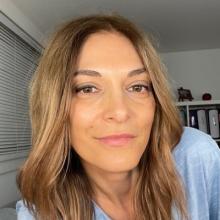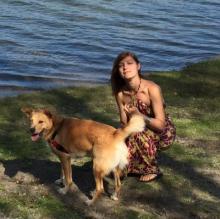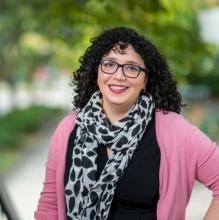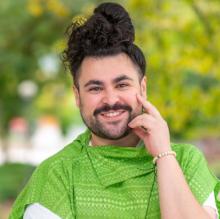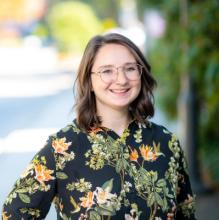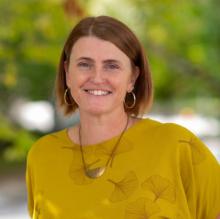Understanding is not enough: I want to make a direct, tangible impact on the life of immigrant and refugee women—a marginalized, under-represented category in many social areas.
Research Description
Women-identified immigrants to Canada encounter ongoing barriers, such as lack of recognition of foreign credentials, occupational reintegration, and limited access to social capital and professional networks. For racialized immigrant women, systemic biases issue in racist behaviours and language-based discrimination in hiring, advancement, and in everyday life in the workplace. My doctoral research looks for solutions to cultural and socio-economic challenges experienced by immigrant professionals and addresses a pressing societal issue—the deskilling of highly skilled immigrant women who are overeducated for the jobs that they are doing in Canada. This research has the potential to suggest guidelines for Canadian immigration policies and contribute to immigrant inclusion.
What does being a Public Scholar mean to you?
To me, being a Public Scholar means extending my PhD research to the international context by conducting research in Eastern Europe with Ukrainian refugee women. Being a Public Scholar also affords me the opportunity to make my voice heard in various public contexts and in doing so, give back to the local and larger community of immigrant women and language teachers. I envison my role as a Public Scholar to be one that builds on own lived experience as an immigrant woman, training and passion as a language teacher, expertise as a curriculum developer, and academic knowledge as a UBC graduate student—all of which share the goal of supporting women through affordable dissemination avenues that integrate multimodal modes of living, being, and doing, and are culturally responsive and environmentally aware.
In what ways do you think the PhD experience can be re-imagined with the Public Scholars Initiative?
The Public Scholar Initiative facilitates networking and fosters connections with like-minded scholars whose research expertise and interests align with mine. I look forward to learning from and with them and possibly initiate collaborative, scholastic and non-scholastic projects that will benefit women—whether living in Canada or abroad. The Public Scholars Initiative supports my commitment to reaching out to wider, non-academic audiences through more accessible means other than mainstream academic conferences and journal articles. The Public Scholars Initiative encourages graduate students to be creative and think outside the box—the academic box. Through the socials, workshops, networking, and funding made available, the Public Scholars Initiative adds new layers of practice and expertise to my PhD experience, creates a space for creativity and innovation, and allows me to connect academic and non-academic settings—both of which are intertwined in terms of my professional, educational, and personal goals. In my opinion, this is re-imagining the PhD experience, at the end of which I believe I will come out more informed, better prepared, and empowered to bring about change.
How do you envision connecting your PhD work with broader career possibilities?
My career-oriented goals are twofold. On the one hand, I intend to continue the work that I have been doing for over a decade with adult language learners in Canada and almost two decades dedicated to teachig English as a Second Language. On the other hand, I intend to apply the theoretical and practical learnings generated by my PhD work and PSI project to real world societal issues centered around women’s struggles, and assist settlement, integration service providers, citizenship and immigration agencies, and regulatory bodies with more effective, alternative ways of supporting newcomers to Canada. To sum up, I am open to both academic and non-academic jobs, and I am confident that, wherever my career takes me, my passion, lived experience, and skillset will guide my decision(s).
How does your research engage with the larger community and social partners?
With my PhD supervisor’s guidance and support, earlier this year I initiated a collaboration between Edith Lando Virtual Learning Centre and Vancouver Community College (VCC)—where I have worked as a Language Instructor for Newcomers to Canada since 2019. The project—Feminist Pedagogies—consisted of a series of free, drop-in sessions meant to assist newcomer learners enrolled at VCC with English language supports focused on women’s issues. We were able to bring academic guest speakers who introduced the topics and did Q&A sessions, followed by me teaching the curriculum that I had designed. This extra-curricular partnership allowed us to reach out to the community of VCC students, collaborate with university professors and the administrative leaders at VCC, and bridge the academic and non-academic sectors—which is what I hope to do more in the future.
Why did you decide to pursue a graduate degree?
While completing my MEd in Educational research—Interdisciplinary Studies—at the University of Calgary, I became interested in questions centered around language teacher identity. This prompted me to delve deeper into scholarly literature dedicated to skilled immigrant women teachers. The research conducted as part of my MEd major research paper shed light on barriers to professional re-entry to the Canadian workforce and discrimination based on gender, accent, age, and religion, which resonated with my personal and professional challenges and was the catalyst behind my decision to pursue a PhD in Education. Importantly, my vested interest and keen curiosity to learn more about what can be done to support international professional women who choose to come to Canada fuelled my decision to further study this topic. Furthermore, the encouragement and support provided by my MEd professors convinced me that pursuing a PhD in Language and Literacy was the the right path for me.
Why did you choose to come to British Columbia and study at UBC?
I decided to study at UBC because of its locally and internationally top rankings in terms of its contribution to teaching, learning, and research. Significantly, the scholarships, fellowships, research opportunities, and wide range of courses available, along with leading scholars and experts in the field of Language and Literacy Education, such as Dr. Bonny Norton, Dr. Maureen Kendrick, and Dr. Jennifer Jenson—to name just a few, and the vibrant campus have all contributed to my decision to choose UBC for my PhD studies. Working with and learning from my wonderful supervisor, Dr. Jenson—who has extensive knowledge of gender studies and feminist methodologies, and experience working with teachers and doctoral students—has had a tremendous impact on my personal and academic growth.
What is it specifically, that your program offers, that attracted you?
While completing the coursework for my MEd at UofC, assigned readings included scholarly articles written by UBC faculty—Dr. Bonny Norton and Dr. Maureen Kendrick, to mention just two—and having the opportunity to learn with and from them as part of the doctoral coursework has improved my academic and research skills. Significantly, working under the supervision of Dr. Jennifer Jenson—a leading scholar and expert in education and gender studies, who has extensive knowledge of feminist methodologies and experience working with teachers and doctoral students—provides my research project with invaluable mentoring, which has had a tremendous impact on my personal and academic growth.
For you, what was the best surprise about graduate life, about UBC or life in Vancouver?
I have lived in Vancouver since 2008: I have felt at home from day one. The beautiful parks, picturesque scenery, quiet green neighbourhoods, pet- and environmentally friendly lifestyle, along with a wide range of restaurants and coffee shops make Vancouver my favorite place—my home. Whenever I walk to classes, to the library, or just take a walk around the campus, I remember the time when I brought my language students on a field trip to the UBC Vancouver campus and I thought to myself, “One day, I will study here.” And that day has come: I am proud and privileged to be a UBC scholar; it motivates me to strive to do my best, give back, and bring about change.
What aspect of your graduate program do you enjoy the most or are looking forward to with the greatest curiosity?
I enjoy being able to connect with peers and faculty and share the learnings generated by my graduate studies and current research. I love working with my wonderful supervisor and the UBC Edith Lando Virtual Learning Centre team: It has afforded me the opportunity to improve my inter- and intrapersonal and social skills, disseminate learning materials designed for English language learners that are meant to bridge the gap between academic and non-academic settings, and host online workshops—which has fostered my online delivery skills and persona.
What do you see as your biggest challenge(s) in your future career?
Deciding what’s next. I am passionate about teaching, and I hope to continue to work with newcomer learners whether at the secondary or higher education level; at the same time, I would like to dedicate myself to working with immigrant women in the education and the wider spectrum. Both newcomer language learners and immigrant (women) teachers pose distinct challenges that I hope to be able to address.
How do you feel your program is preparing you for those challenges?
The program provides a wealth of opportunities to better myself both as an academic leader and scholar. Furthermore, working with my supervisor on extra-curricular projects has enriched my repertoire as a language teacher and broadened my network of likeminded academics.
What aspects of your life or career before now have best prepared you for your UBC graduate program?
Coming to Canada as a single skilled immigrant teacher has prepared me to adapt to unexpected challenges and work hard to accomplish my goals. Being open-minded and becoming involved in the community has materialized as invaluable support that has helped me adjust to my new life in Canada. I see all these prior lived experiences as stepping stones to my PhD journey.
What do you like to do for fun or relaxation?
I love taking long walks with my rescue dog Max, running, riding my bike, trying out new restaurants and coffee places, and discovering new green neighborhoods. One of my favorite things to do in the summer is to soak up the sun at Kits beach, while listening to music or chilling out with a good book.
Do you have any tips for students from your home country coming to Canada / to UBC Grad School?
Make the most of this academic endeavour and personal experience—own it—whether that means growing your network of mindlike peers, immersing yourself in the culture and social activities, pushing yourself out of your comfort zone (for me, one example was presenting at local and international conferences for the first time), seeking out help (be it study-, health-, and/or wellbeing-related), or fostering authentic relationships with fellow graduate students and faculty. Having said that, take it in your stride: Work towards accomplishing your goals, don’t compare yourself (achievements and setbacks included) with others but with yourself, keep your curiosity and passion for your research, and have fun. For me, this has been the experience of a lifetime and I hope for incoming and current UBC students as well.

